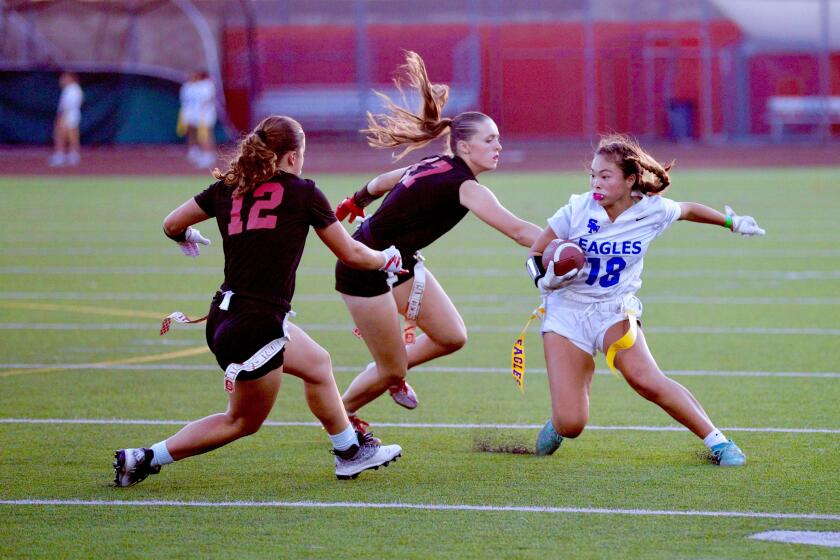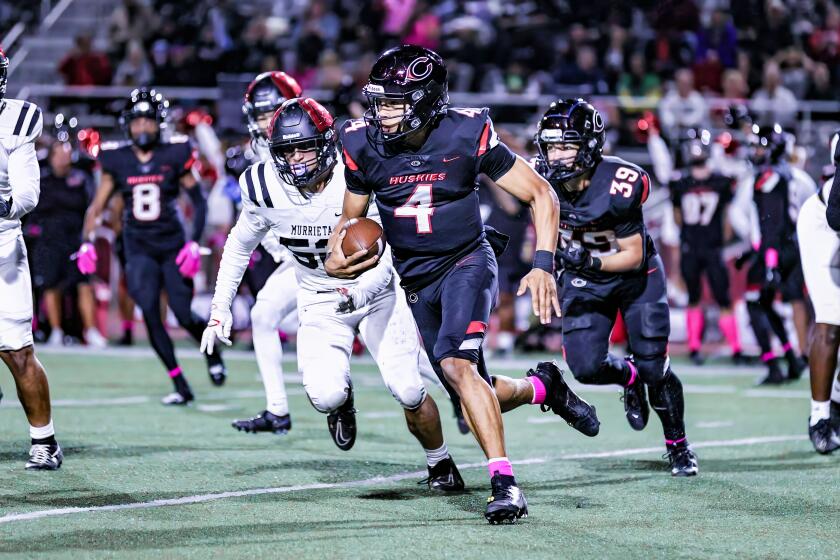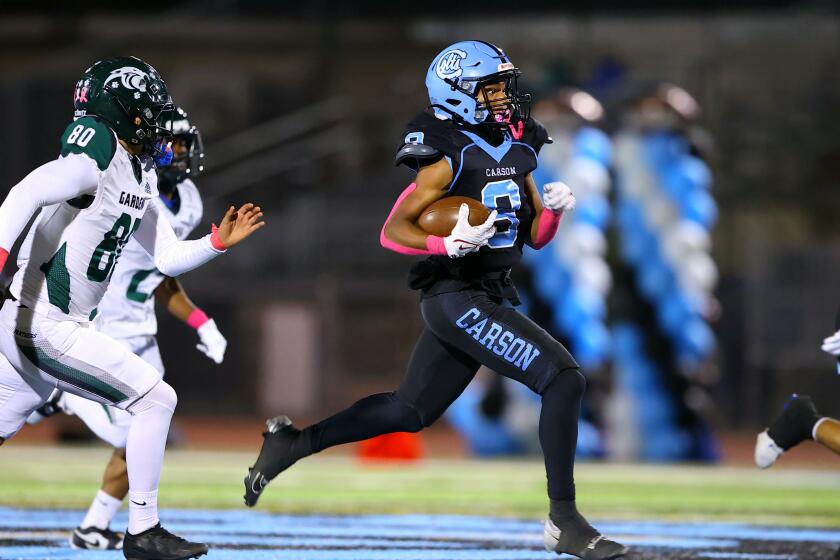Coach Embraces New Position After Devastating Loss of Son : Canyons: Clark, who led overachieving teams at Saugus High, grieves a little less, grows a little more as Cougars’ top assistant.
Signs of growth are all around John Clark. Most significantly, in his career. Most noticeably, atop his head.
Most poignantly, outside his door.
Just a few steps from Clark’s Saugus High classroom stands a small tree, its gray branches bare in the winter chill, its slender trunk surrounded by a modest red-brick planter with a small plaque: “Jackson Paul Clark. Courage. Spirit. Grace.”
It took Clark months to finally plant the tree. Life planted a heavy loss on him 16 months ago when his only son died at 22 of a rare form of intestinal cancer. Erecting the memorial was part of the healing process--and it was just as slow and as tearful.
“It took me a long time,” Clark said. “First, I dug the hole. Then I recruited a friend of mine and we slowly started putting in the bricks. Then it took me a long time to get the tree in.”
Clark paused to reflect. “But now,” he said, “the tree’s just gonna grow.”
Much like the hair on Clark’s head, which he shaved last season--his final campaign as boys’ basketball coach at Saugus--as a salute to Jackson, who had sheared his blond mane before chemotherapy could claim it. “I’m letting it grow out,” Clark said, tugging at thin, gray strands. “I probably need a haircut.”
And the tree will grow, as will Clark. The biggest part of the healing process was getting his own roots back in the ground. And Clark has found a healthy environment in which to do that.
Clark, 47, is the top assistant to Lee Smelser, coach of the College of the Canyons men’s team. As the staff’s defensive specialist Clark, with his stern countenance, high-pitched scream and fervent approach, has done more than his share in helping to lead the Cougars into tonight’s opening round of the Southern California junior college regional. Canyons (18-14) will play at MiraCosta at 7 p.m.
“He really works the kids to produce an honest effort and a commitment that is 100%, and he insists on it and works toward it every single day,” Smelser said. “I think the kids have picked up on that.”
In nine years at Saugus, Clark developed a reputation as a disciplinarian with a soft side and a knack for extracting the most from players. Often his teams were low on talent but high on emotion.
“He’s very strict and he wants things done correctly,” said freshman guard Steve Tampus, who played two seasons for Clark at Saugus. “Immediately, correctly and perfectly.”
Many will remember the 1986-87 Centurions, who won a remarkable seven consecutive playoff games, including the Southern Section 3-A Division championship, after entering the playoffs as a wild-card team.
Of less renown, but every bit as memorable to Clark, is his 1991 team, a similar cast of underachievers who again entered the playoffs as a wild-card team but advanced to the Division I-A semifinals.
“My kids always cared,” Clark said. “They either cared or they didn’t get a uniform. I worked them so hard they had to care.”
These days, Clark is walking with a slight limp, the result of a pulled leg muscle suffered during practice while emphasizing hustle.
“I’m finding that I’ve never worked harder, even though I’m not the head coach,” said Clark, who has retained his teaching position at Saugus High. “It’s time-consuming and it’s energy-consuming. The task at hand is a big one. But I like the job. And Lee has been very good to me.”
That Clark has plunged himself wholeheartedly into his new assignment is characteristic. For years, he has gone to bed before prime time and awakened before the neighborhood paper boy. The Spartan life also might be part of the healing process in his struggle as a grieving father.
How is he doing? “Probably not good,” he said. “Probably angry at the world. I probably think about Jack, maybe 600 times a day.”
Tears still come at the mention of Jackson, who played guard for the 1986-87 team before enrolling at UC Santa Barbara. Clark describes his son as an overachiever, an exceptionally hard worker and “such a good person.”
In the summer of 1991, Jackson began feeling mysterious abdominal pains that eventually were diagnosed as an inoperable tumor. Throughout his son’s illness, Clark confided in few friends. Little has changed.
“It’s been difficult for him, I know,” Smelser said. “He told me he’s had some tough times. I know that. But he never brings it onto the floor. It’s just a matter of taking time.”
Those close to Clark say basketball is helping. His second wife, Linda, an economics teacher at Saugus who met Clark during the Centurions’ championship season, said she feared her husband might give up coaching after Jackson’s death.
“It’s obvious to me that it’s something he lives with every single minute of every single day,” she said. “I don’t think he’ll ever recover from his loss, but he’ll always try to do his very best. Mediocrity in basketball is just not consistent in the way he does things. No matter how much his heart is broken he’s never going to give up.”
Contrary to what many have thought, Clark’s move to the college ranks involved more than the loss of his son. Days after Jackson’s death in October, 1991, Clark announced that he would coach one final season at Saugus. But he and Smelser had been talking for years before Clark agreed the time had come.
“When I lost Jackson, that was the straw that broke the camel’s back,” Clark said. “I had accomplished everything (at Saugus) I wanted to accomplish in terms of winning. My ego is not such that I need to be trying to win Foothill League championships when I’m 50 years old. And what would I want with another (Southern Section) championship?”
Greener pastures lie ahead. Canyons has sputtered this season, but the Cougars rallied to win their final four regular-season games to finish second in the Western State Conference South Division and squeeze into the 32-team regional.
“It’s been a struggle because we might be a step slow and a few inches short,” Clark said. “We’ve played teams with better athletes, but we’ve won because we’ve worked harder.”
Like Clark. And Jackson.
“I try to do the best I can,” Clark said. “Not for myself so much, but kind of as a salute to a kid who always worked his butt off. For some reason, he grew up being a worker.”
Get our high school sports newsletter
Prep Rally is devoted to the SoCal high school sports experience, bringing you scores, stories and a behind-the-scenes look at what makes prep sports so popular.
You may occasionally receive promotional content from the Los Angeles Times.



